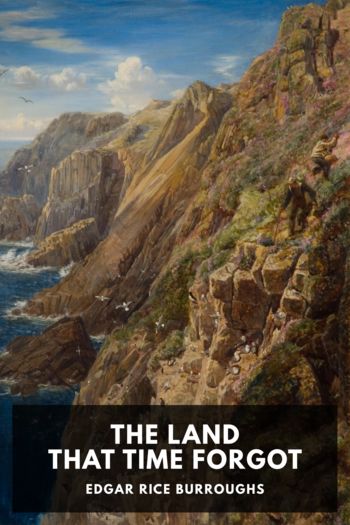South!, Ernest Shackleton [good books to read in english TXT] 📗

- Author: Ernest Shackleton
Book online «South!, Ernest Shackleton [good books to read in english TXT] 📗». Author Ernest Shackleton
The hours dragged on. One of the anxieties in my mind was the possibility that we would be driven by the current through the eighty-mile gap between Clarence Island and Prince George Island into the open Atlantic; but slowly the open water came nearer, and at noon it had almost reached us. A long lane, narrow but navigable, stretched out to the southwest horizon. Our chance came a little later. We rushed our boats over the edge of the reeling berg and swung them clear of the ice-foot as it rose beneath them. The James Caird was nearly capsized by a blow from below as the berg rolled away, but she got into deep water. We flung stores and gear aboard and within a few minutes were away. The James Caird and Dudley Docker had good sails and with a favourable breeze could make progress along the lane, with the rolling fields of ice on either side. The swell was heavy and spray was breaking over the ice-floes. An attempt to set a little rag of sail on the Stancomb Wills resulted in serious delay. The area of sail was too small to be of much assistance, and while the men were engaged in this work the boat drifted down towards the ice-floe, where her position was likely to be perilous. Seeing her plight, I sent the Dudley Docker back for her and tied the James Caird up to a piece of ice. The Dudley Docker had to tow the Stancomb Wills, and the delay cost us two hours of valuable daylight. When I had the three boats together again we continued down the lane, and soon saw a wider stretch of water to the west; it appeared to offer us release from the grip of the pack. At the head of an ice-tongue that nearly closed the gap through which we might enter the open space was a wave-worn berg shaped like some curious antediluvian monster, an icy Cerberus guarding the way. It had head and eyes and rolled so heavily that it almost overturned. Its sides dipped deep in the sea, and as it rose again the water seemed to be streaming from its eyes, as though it were weeping at our escape from the clutch of the floes. This may seem fanciful to the reader, but the impression was real to us at the time. People living under civilized conditions, surrounded by Nature’s varied forms of life and by all the familiar work of their own hands, may scarcely realize how quickly the mind, influenced by the eyes, responds to the unusual and weaves about it curious imaginings like the firelight fancies of our childhood days. We had lived long amid the ice, and we half-unconsciously strove to see resemblances to human faces and living forms in the fantastic contours and massively uncouth shapes of berg and floe.
At dusk we made fast to a heavy floe, each boat having its painter fastened to a separate hummock in order to avoid collisions in the swell. We landed the blubber-stove, boiled some water in order to provide hot milk, and served cold rations. I also landed the dome tents and stripped the coverings from the hoops. Our experience of the previous day in the open sea had shown us that the tents must be packed tightly. The spray had dashed over the bows and turned to ice on the cloth, which had soon grown dangerously heavy. Other articles off our scanty equipment had to go that night. We were carrying only the things that had seemed essential, but we stripped now to the barest limit of safety. We had hoped for a quiet night, but presently we were forced to cast off, since pieces of loose ice began to work round the floe. Drift-ice is always attracted to the lee side of a heavy floe, where it bumps and presses under the influence of the current. I had determined not to risk a repetition of the last night’s experience and so had not pulled the boats up. We spent the hours of darkness keeping an offing from the main line of pack under the lee of the smaller pieces. Constant rain and snow squalls blotted out the stars and soaked us through, and at times it was only by shouting to each other that we managed to keep the boats together. There was no sleep for anybody owing to the severe cold, and we dare not pull fast enough to keep ourselves warm since we were unable to see more than a few yards ahead. Occasionally the ghostly shadows of silver, snow, and fulmar petrels flashed close to





Comments (0)